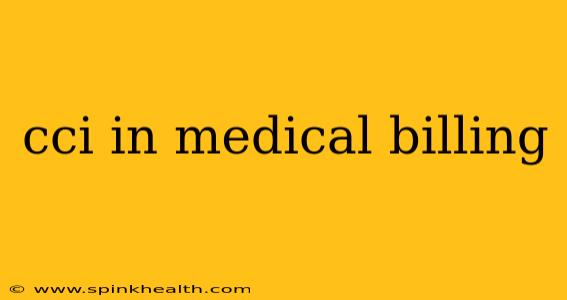Medical billing is a complex process, and understanding the nuances is crucial for smooth reimbursements. One of the significant challenges faced by healthcare providers is navigating CCI edits, or Correct Coding Initiative edits. These edits, implemented by the Centers for Medicare & Medicaid Services (CMS), aim to prevent improper payments by identifying and correcting instances of inappropriate code combinations. Think of them as the gatekeepers of accurate medical billing, ensuring that only legitimate charges are processed.
Let's unravel the mystery behind CCI edits and learn how to navigate them effectively. Our journey begins with understanding their core purpose.
What are CCI Edits in Medical Billing?
Imagine a scenario where a doctor performs both a comprehensive and a detailed examination on the same day for the same patient. This might seem redundant, and that's precisely where CCI edits come into play. These edits are a set of rules that identify code pairs – often pairs of procedures or services – that should not be billed together because one code inherently includes the other. Billing both would lead to overpayment, which is what CCI edits prevent. These edits don't just apply to comprehensive and detailed exams. They encompass a wide range of medical procedures and services.
Think of CCI edits as a sophisticated system of checks and balances ensuring fair and accurate billing practices across the healthcare industry. They're a critical part of maintaining the integrity of the billing process and preventing fraud.
How do CCI Edits Work?
CCI edits are essentially a database of code pairs. When a claim is submitted, the billing software cross-references the codes used with this database. If a disallowed code combination is detected, the claim is flagged, and either one of the codes is rejected or a payment adjustment is made. The specific action taken depends on the nature of the disallowed codes and the payer's specific rules.
The complexity arises from the vast number of potential code combinations, the constant updates to the code sets (CPT, HCPCS, ICD), and the occasional ambiguities in the application of the rules.
Why are CCI Edits Important for Medical Practices?
Failing to adhere to CCI edits can lead to significant financial repercussions for medical practices. Rejected claims mean delayed or reduced reimbursements, impacting revenue cycles. Repeated violations might even trigger audits, leading to further penalties and investigations.
Understanding and implementing CCI edits is therefore not just a matter of compliance; it’s a crucial aspect of sound financial management for any medical practice. It safeguards the practice from potential financial losses and protects its reputation.
What Happens if a CCI Edit is Rejected?
When a claim is rejected due to a CCI edit, you'll typically receive a rejection notification from the payer, detailing the specific codes that caused the rejection and explaining why they're incompatible. This necessitates a careful review of the documentation, ensuring that the codes accurately reflect the services rendered. You may need to adjust the codes, resubmit the claim, or even appeal the rejection if you believe the original coding was appropriate. The process for appealing a rejection varies depending on the payer.
How Can Medical Practices Avoid CCI Edit Errors?
Proactive measures are key to avoiding CCI edit issues. Here are some crucial strategies:
- Invest in a reliable billing system: Modern billing software incorporates CCI edit checks, flagging potential issues before submission.
- Regularly update your software: Updates ensure that your system is compliant with the latest CCI edits and code sets.
- Proper documentation: Clear and comprehensive medical documentation is paramount. It allows for accurate coding and supports any potential appeals.
- Regular training for coders: Ongoing training keeps your coding staff updated on CCI edit rules and best practices.
- Employ a medical billing specialist: A dedicated specialist can ensure accurate coding and timely claim submissions.
Are CCI Edits Different for Different Payers?
Yes, while CMS establishes the foundation for CCI edits, individual payers may have their own additional rules or modifications. This emphasizes the importance of understanding the specific requirements of each payer you work with. A claim that’s acceptable by one payer might be rejected by another.
Navigating the world of CCI edits is a crucial aspect of successful medical billing. While challenging, adhering to these guidelines protects your practice from financial loss, maintains compliance, and contributes to the integrity of the healthcare billing system. By proactively addressing CCI edits, medical practices can focus on providing quality care while ensuring financial stability.

